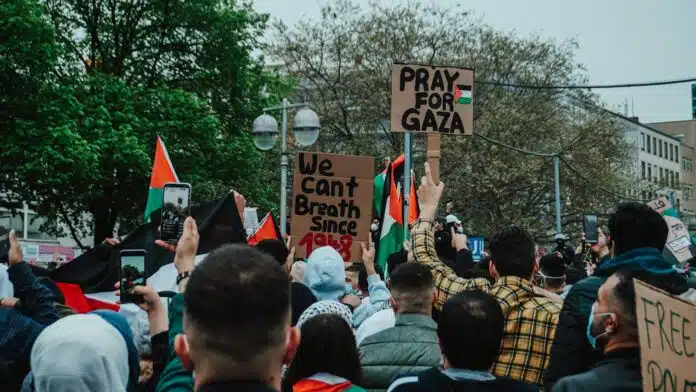Negotiations between Israel and Hamas stall as demands deemed ‘impossible’ are reiterated, while Israel targets Al Jazeera operations
Recent attempts to broker a ceasefire between Israel and Hamas have hit a significant impasse, highlighting the complexity and volatility of the situation. Israeli Prime Minister Benjamin Netanyahu has rejected the terms proposed by Hamas during the negotiations, which included a complete troop withdrawal from Gaza and an end to the conflict, labelling these demands as unrealistic. This rejection came despite Netanyahu’s offer of a 40-day truce aimed at facilitating the release of the most vulnerable among approximately 130 hostages currently held by Hamas. The backdrop of these strained talks is further complicated by Israel’s aggressive stance against Al Jazeera, with the Israeli cabinet voting to close the broadcaster’s local offices, a move condemned internationally as an assault on press freedom. This article delves into the detailed coverage from various publications on the unfolding situation.
The Sun :
The Sun’s report focuses on the faltering hopes for a ceasefire due to Hamas’ steadfast demands and Israel’s response. According to The Sun, Israeli Prime Minister Benjamin Netanyahu has not only refused the terms set by Hamas but has also expressed a readiness to escalate military actions against Hamas’ strongholds in Gaza, specifically targeting the city of Rafah. The article notes that Netanyahu’s offer of a 40-day truce aimed at the release of hostages was met with demands from Hamas that Israel saw as a potential security threat, fearing it would allow Hamas to regroup and renew hostilities. The Sun emphasizes Netanyahu’s resolve to “smash Hamas and capture or kill its leaders” in response to the October 7 attacks, which ignited the current conflict and led to significant casualties. This narrative underlines the Israeli government’s rigid stance and its broader implications for peace prospects in the region.
Al Jazeera :
Al Jazeera provides a contrasting perspective, heavily critiquing Israel’s decision to shut down its operations within the country. The network describes this move as a blatant violation of human rights and press freedom, directly challenging the Israeli government’s justification of the closure as a necessary security measure. Al Jazeera reports extensively on the impact of the conflict on journalists and the media landscape, citing instances of intimidation, arrests, and the targeting of journalists in Gaza. The network’s coverage also sheds light on the broader geopolitical implications of Israel’s actions, including potential strains on its relationship with Qatar, which funds Al Jazeera. This coverage portrays the closure of Al Jazeera’s offices not just as a local media issue but as part of a larger effort by Israel to control the narrative surrounding its military operations and policies in Gaza.
Sky News :
Sky News’ coverage centres on the rejection by Netanyahu of the ceasefire demands from Hamas, which would leave the militant group “intact” and capable of future hostilities. The report highlights the ongoing mediated negotiations in Egypt and the intense domestic pressure on the Israeli government to secure a deal that would lead to the release of hostages. Sky News also reports on the broader implications of the conflict, including the significant humanitarian concerns in Gaza and the potential for further escalation. The article details Israel’s strategic and tactical considerations, particularly its plans to continue and even intensify military operations in Gaza, which are framed as necessary to protect Israeli citizens from future attacks. This perspective is crucial in understanding the Israeli government’s stringent security-first approach and its reluctance to make concessions that could potentially compromise its long-term security objectives.
The complexities of the Gaza ceasefire talks are evident in the diverging narratives presented by different media outlets. The inability of the parties to agree on ceasefire terms and the subsequent Israeli crackdown on Al Jazeera highlight the deep-seated tensions and the challenging path ahead for any lasting peace in the region. The international community continues to watch closely as both sides hold firm to their positions amidst ongoing violence and a fraught media landscape.
